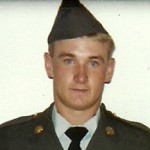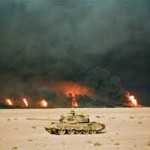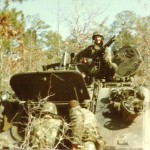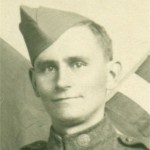operation desert storm
 Once a war is over, the people of the world, and especially those who fought in the war never really want to think about it again, but it is, nevertheless, a permanent part of history. It was on this day, January 16, 1991 that America would go to war with Iraq for the first time, and it would be a war that would ultimately draw my brother-in-law, Ron Schulenberg back into the service from the reserves, which is where every soldier is for a time following their active duty term. Ron had joined the Army during a time when things were relatively quiet around the world, and he also ended his active service during a relative time of peace, but all that would change for him when he was notified that he would have to go back to active duty, and to Iraq.
Once a war is over, the people of the world, and especially those who fought in the war never really want to think about it again, but it is, nevertheless, a permanent part of history. It was on this day, January 16, 1991 that America would go to war with Iraq for the first time, and it would be a war that would ultimately draw my brother-in-law, Ron Schulenberg back into the service from the reserves, which is where every soldier is for a time following their active duty term. Ron had joined the Army during a time when things were relatively quiet around the world, and he also ended his active service during a relative time of peace, but all that would change for him when he was notified that he would have to go back to active duty, and to Iraq.
I can only imagine how Ron felt upon receiving that letter. I know how the rest of us felt. We were very concerned for Ron’s safety. None of us wanted him to go, but this was not up to us. The government, and specifically the Army had spoken, and go he would. I remember talking to him about his time over there, years later. One of the things that most civilians wonder about is things like how they felt about killing someone else, or even just seeing a dead body that had been mutilated by the weapons of warfare. For Ron, one of the  strongest memories was marching from one place to another and seeing all the death that was all around them…and then simply stepping over it, like it was a rock or tree stump. In my mind, that would be almost impossible to do, but I suppose that you simply get used to some things…or as much as anyone can get used to war and death.
strongest memories was marching from one place to another and seeing all the death that was all around them…and then simply stepping over it, like it was a rock or tree stump. In my mind, that would be almost impossible to do, but I suppose that you simply get used to some things…or as much as anyone can get used to war and death.
The Persian Gulf War…known as Operation Desert Storm, was a short lived war. Saddam Hussein invaded the little country of Kuwait, because of their oil, making Egypt and Saudi Arabia very nervous, so they called on the United States. When Saddam Hussein refused to leave Kuwait, the war began. The biggest anomaly in Operation Desert Storm, was that the Iraqi soldiers were either not well enough equipped, or simply not willing to die for this cause, and so may of them actually came up to the American troops, and surrendered. I’m sure that the initial fighting, and the amount of war dead lying around the desert, made the decision to surrender seem like the best option. Ron told of this anomaly when we talked about his experiences, and it seemed that it was with a continued sense of relief. I can imagine that the thought of having to kill someone was not one that my brother-in-law relished, but something he would have had to do, had it became necessary.

Ron returned to us from Operation Desert Storm, and his time in the reserves ended. The Persian Gulf area would continue to become more and more unstable, but by the time America would again find herself at war with Iraq and Saddam Hussein, Ron was not required to go. While it is my belief that the second war with Iraq has been far more successful, it has also been filed with far more casualties. I believe that if we had gone in and removed Saddam Hussein during Operation Desert Storm, the world would have been a better place. Would that have prevented the need to go back? I don’t know, but it would have spared many of the lives of the countless people that Saddam Hussein slaughtered during his time in power.
 When we think of war, we usually think of planes and tanks, bombs and guns, but lately I have been wondering just what the life of a foot soldier was like. My grandfather served in World War I, and after reading a little bit about what it was like for the men in the trenches, I find myself feeling very thankful that my grandfather was a cook. I don’t know how he got that position, considering that so many soldiers were needed, and the number needed grew daily, or even hourly, I just don’t know how he was so blessed to be a cook. Grandpa Byer was always such a gentle, soft hearted man, so I have a really hard time imagining him in a position of having to kill someone. I read that when new foot soldiers came to the front, many lost their lives on the first day, because they got into the trenches, and got an overwhelming urge to peek out over the top to see if the enemy was coming. The instant they peeked over the top, a sniper’s bullet would rip through their head, killing them instantly. The commanding officers began telling the new men to keep their head down…no matter what.
When we think of war, we usually think of planes and tanks, bombs and guns, but lately I have been wondering just what the life of a foot soldier was like. My grandfather served in World War I, and after reading a little bit about what it was like for the men in the trenches, I find myself feeling very thankful that my grandfather was a cook. I don’t know how he got that position, considering that so many soldiers were needed, and the number needed grew daily, or even hourly, I just don’t know how he was so blessed to be a cook. Grandpa Byer was always such a gentle, soft hearted man, so I have a really hard time imagining him in a position of having to kill someone. I read that when new foot soldiers came to the front, many lost their lives on the first day, because they got into the trenches, and got an overwhelming urge to peek out over the top to see if the enemy was coming. The instant they peeked over the top, a sniper’s bullet would rip through their head, killing them instantly. The commanding officers began telling the new men to keep their head down…no matter what.
World War I was supposed to be a war that ended quickly, but that isn’t how it happened. Going in, it was expected that the whole thing would end after one big movement…shock and awe, I suppose, but the other side had a different idea, and the soldiers were forced to hunker down for the long haul. In the end, the war lasted from the fall of 1914 to the spring of 1918. There was movement in the beginning as the Germans marched through Belgium and France on their way to Paris, but then while the lines did advance and retreat, there was not a lot of movement until the war neared it’s end.
I can’t say that I have much insight into the ways of war, other than what I have been told or have read, but it doesn’t take much imagination to be able to picture those fear filled kids hearing the gun shots all around them, just hoping they can keep their wits about them long enough not to do something stupid that could cost them their lives. I don’t think war has changed so much in recent years either. My brother-in-law, Ron Schulenberg told me a little bit about his war experience during Operation Desert Storm. Ron was a foot soldier, and he told me about marching across the desert, stepping over the bodies of the enemy’s dead soldiers, and getting to the point where something like that no longer made him feel like he was going to be sick. For me, it is hard to imagine how much death you would have to see to put you in a place of being able to just step over a dead body and march on.
Almost every war has it boots on the ground part. They are often the first soldiers in the war, and they have to  pave the way for those who will follow. They are a tough, almost street smart…or is it trench smart…soldier, who knows what to expect from guerilla warfare, or at least as much as anyone can know what to expect before they go to war. It occurs to me that a soldier going into a war is a completely different person than a soldier coming out of a tour of duty. You simply can’t spend time around all that death, not knowing if you will ever leave that place, and not be completely changed by it. No wonder so many of our soldiers come out of their tour of duty with Post Traumatic Stress Disorder. These men came into the war as kids, and came out feeling like old men. That is not the way they imagined their post high school years, but when you are serving your country, your high school/boyhood ideas have to be set aside to make way for the skills and mindset you must have to survive the life of a foot soldier.
pave the way for those who will follow. They are a tough, almost street smart…or is it trench smart…soldier, who knows what to expect from guerilla warfare, or at least as much as anyone can know what to expect before they go to war. It occurs to me that a soldier going into a war is a completely different person than a soldier coming out of a tour of duty. You simply can’t spend time around all that death, not knowing if you will ever leave that place, and not be completely changed by it. No wonder so many of our soldiers come out of their tour of duty with Post Traumatic Stress Disorder. These men came into the war as kids, and came out feeling like old men. That is not the way they imagined their post high school years, but when you are serving your country, your high school/boyhood ideas have to be set aside to make way for the skills and mindset you must have to survive the life of a foot soldier.

